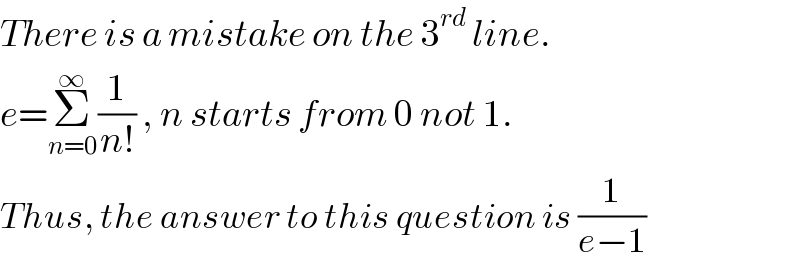
Question and Answers Forum
Question Number 77234 by TawaTawa last updated on 04/Jan/20

Answered by mr W last updated on 04/Jan/20
![=∫_0 ^1 x^(1/2) x^((1/2)×(1/3)) x^((1/2)×(1/3)×(1/4)) x^((1/2)×(1/3)×(1/4)×(1/5)) ...dx =∫_0 ^1 x^((1/(1×2))+(1/(1×2×3))+(1/(1×2×3×4))+(1/(1×2×3×4×5))+...) dx =∫_0 ^1 x^(Σ_(n=0) ^∞ (1/(n!))−2) dx =∫_0 ^1 x^(e−2) dx =(1/(e−1))[x^(e−1) ]_0 ^1 =(1/(e−1))](Q77235.png)
Commented by TawaTawa last updated on 04/Jan/20

Commented by TawaTawa last updated on 04/Jan/20

Commented by TawaTawa last updated on 04/Jan/20

Commented by TawaTawa last updated on 04/Jan/20

Commented by TawaTawa last updated on 04/Jan/20

Commented by TawaTawa last updated on 04/Jan/20

Commented by Smail last updated on 04/Jan/20

Commented by TawaTawa last updated on 04/Jan/20

Commented by TawaTawa last updated on 04/Jan/20

